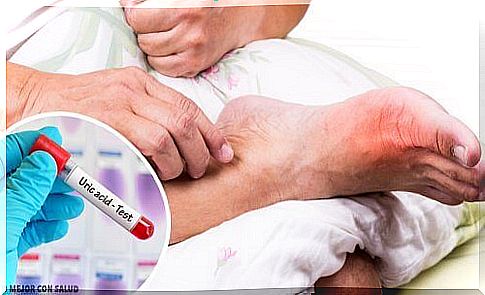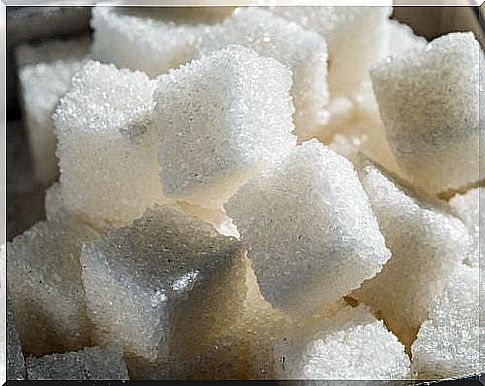5 Causes Of Increased Uric Acid Levels
If too much uric acid accumulates in the blood, the kidneys cannot discharge it properly, which can have unpleasant health consequences. But how do elevated uric acid levels occur?

Elevated uric acid levels are also known as hyperuricemia. Diet plays a fundamental role in this, because uric acid is produced when purines are broken down, which are ingested through food. If it is not expelled through the urine, uric acid crystals will accumulate in the joints. We will then take a closer look at the causes of increased uric acid levels .
The normal uric acid levels are between 2.4 and 6.0 mg / dL in women and between 3.4 and 7.0 mg / dL in men. Since excessively high uric acid levels have negative effects on health, it is very important to control these levels.
Causes of increased uric acid levels
One third of the uric acid in the body is produced by consuming foods and beverages containing purines. The rest is produced naturally by the body itself, so it is important to know the causes of high uric acid levels in order to control them.
1. Bad diet

Diet is usually not the only cause, but it plays a very important role in the control and development of the disease. Purine-rich foods include meat, offal, fish, sausage products and hamburgers. This increases the uric acid level.
Too much salt also plays an important role, because it prevents the proper elimination of these substances.
2. White sugar
Sugar-rich foods such as manufactured baked goods, soft drinks, industrial fruit juices, chocolate, and other sweets can also lead to high uric acid levels.
Sucrose and fructose are also harmful! It’s best to avoid these sweeteners and include more fresh fruits and vegetables in your diet.
3. Alcohol consumption

Alcohol not only affects the production of uric acid, but also its excretion. Alcoholic beverages, especially beer, contain purines, which increase uric acid levels. At the same time, alcohol makes it more difficult for uric acid to be excreted in the urinary tract.
The intestinal flora can also be impaired as a result, as fewer healthy bacteria are present in the intestine.
4. Diuretics
These drugs are used to help flush water through the kidneys to control blood pressure. However, as the kidneys expel more water, the risk of increased uric acid levels increases because less uric acid is excreted.
5. Obesity and overweight

Overweight or obesity can also lead to high uric acid levels and, as a result, to gout. In this extremely painful disease, uric acid crystals accumulate in the joints.
If you are overweight or have diabetes, more uric acid is produced, but excretion is slower.
Change of diet to lower uric acid levels
If the uric acid level is only slightly elevated, an appropriate diet may be sufficient. Foods high in fiber reduce blood sugar levels and encourage the uptake of uric acid in the intestines.
These foods contain a lot of fiber:
- oats
- spinach
- broccoli
- Foods high in antioxidants: blueberries, tomatoes, grapes, Swiss chard …
- Whole grain cereals
- White flour products should be replaced with whole grains, e.g. white bread, baked goods, etc.
- It is advisable to switch to whole grain products and to avoid refined carbohydrates (white bread, baked goods, sweets …). They only contain empty calories, but no nutrients.
Avoid the following foods

- Trans fats
- sugar
- alcohol
- Unhealthy fats increase the triglyceride level, these lipids accumulate in the arteries and can clog them and produce a heart attack, for example.
- Baked goods usually contain high levels of saturated fats, which are unhealthy.
- As mentioned earlier, alcohol prevents uric acid from being removed from the body.
- Reduce your consumption of meat, chicken, and fish, as animal proteins increase uric acid levels.
Other Recommendations
Don’t forget to drink enough water to encourage uric acid drainage. We recommend 2 to 3 liters a day.
- Reduce salt as much as possible to prevent fluid retention.
- Include plenty of fresh fruits and vegetables in your diet.
- Cut down on red meat and sausages as much as possible.
- Avoid consuming alcohol.
- Exercise regularly. You can also use it to improve your general health and prevent joint problems.
- Maintain a healthy weight.
- Increase your intake of vitamin C. 500 mg daily is recommended to reduce uric acid levels.
- Herbal teas can also be of great benefit! Horsetail and nettle are great for reducing uric acid levels and improving kidney functions.
- A healthy diet and adequate exercise are fundamental to health and the prevention of many diseases.









